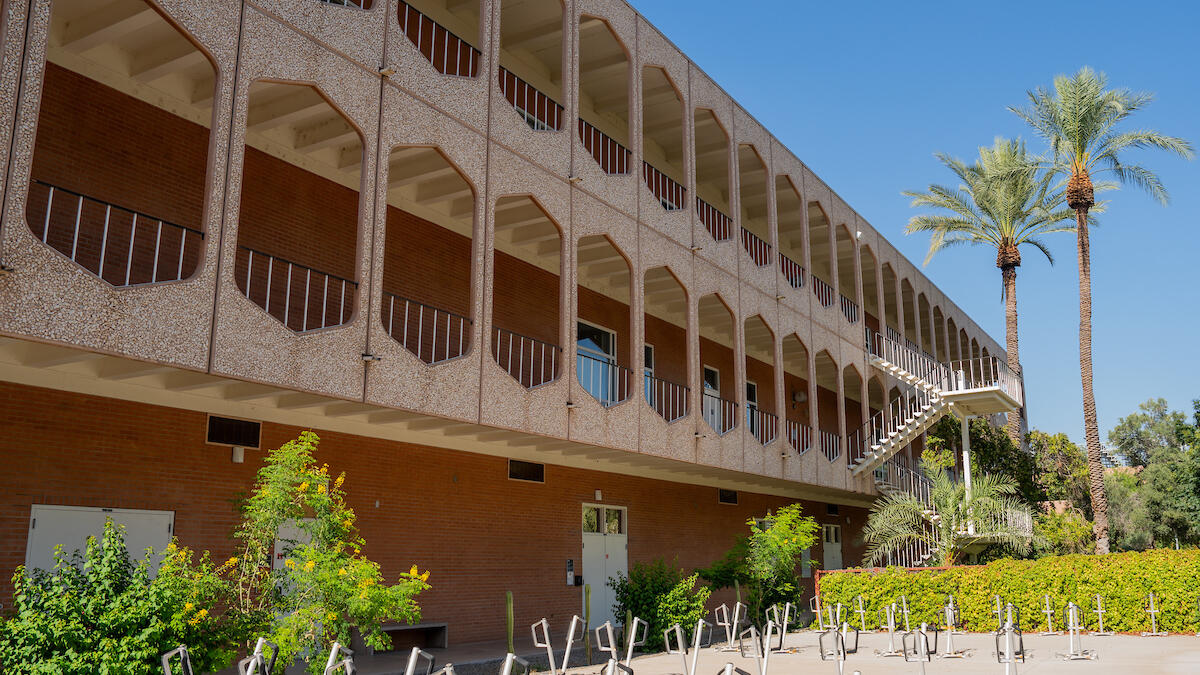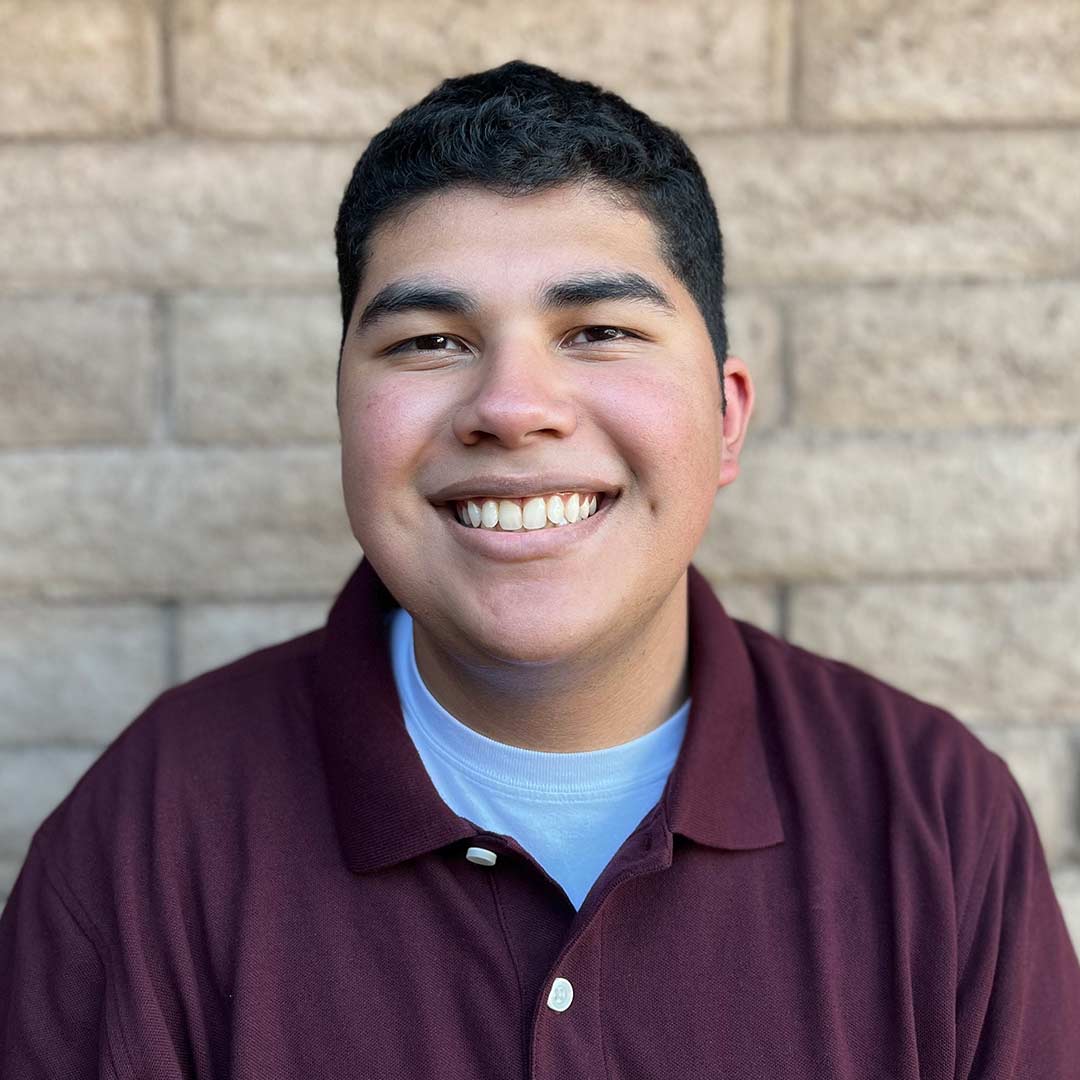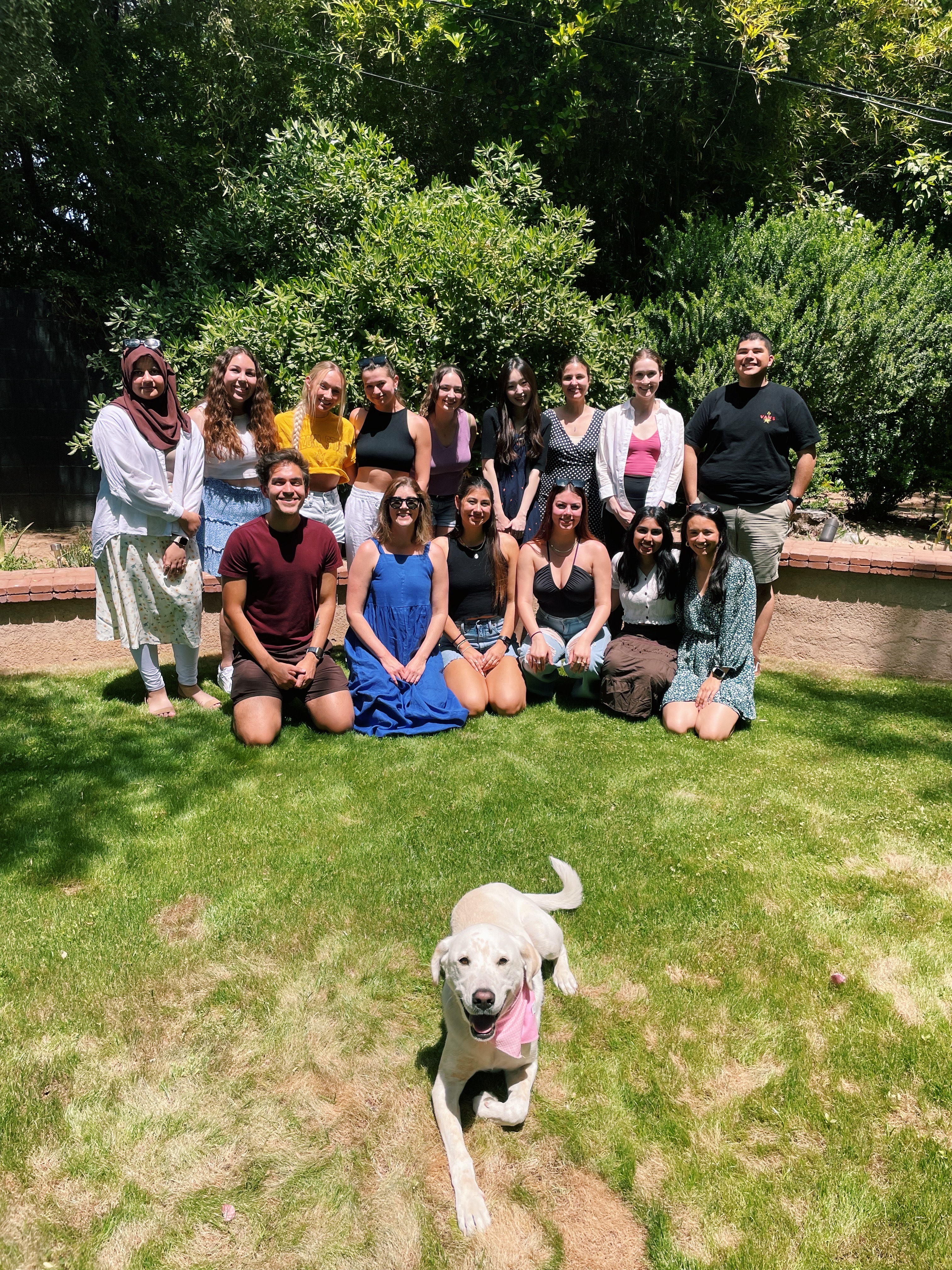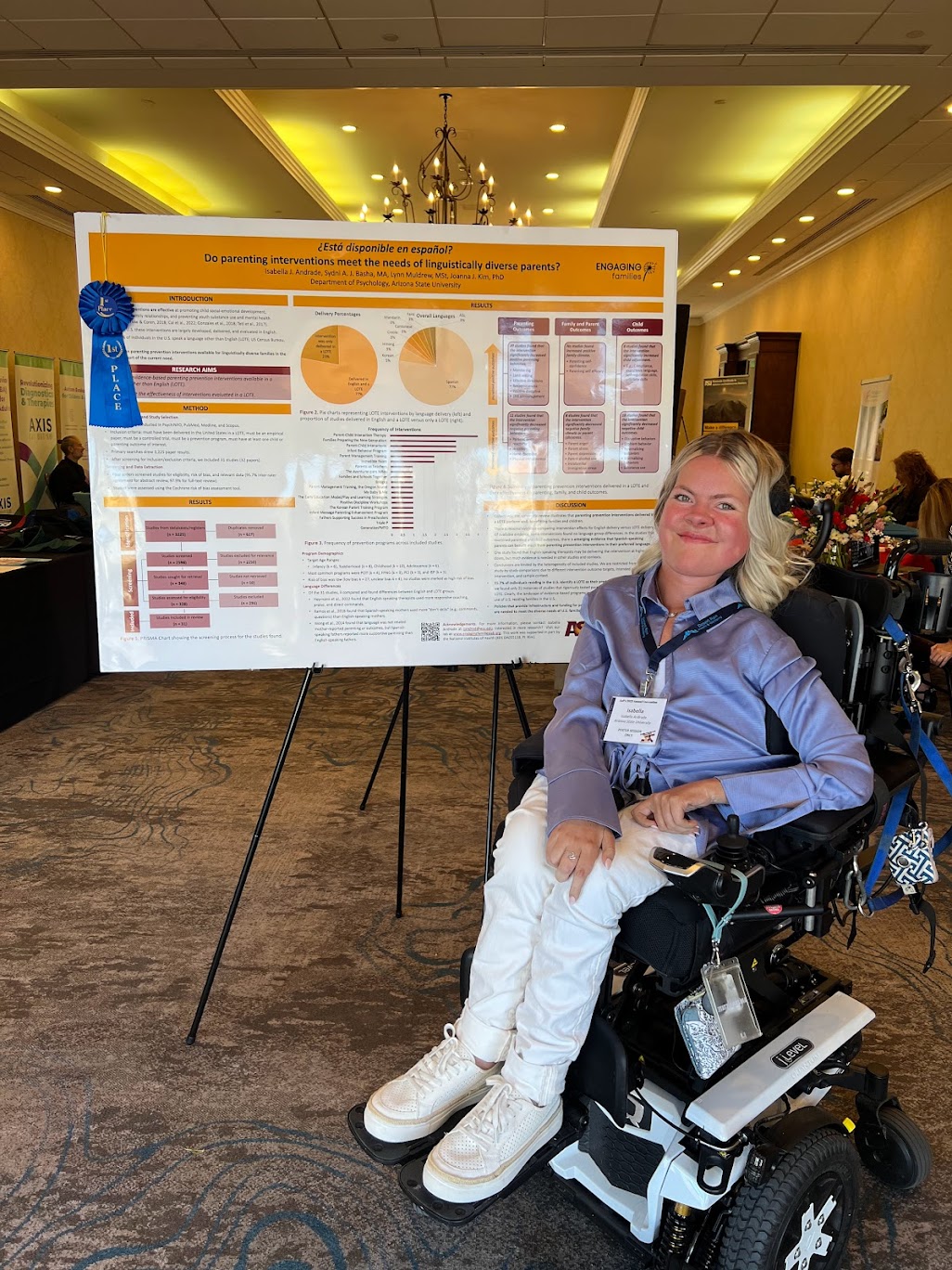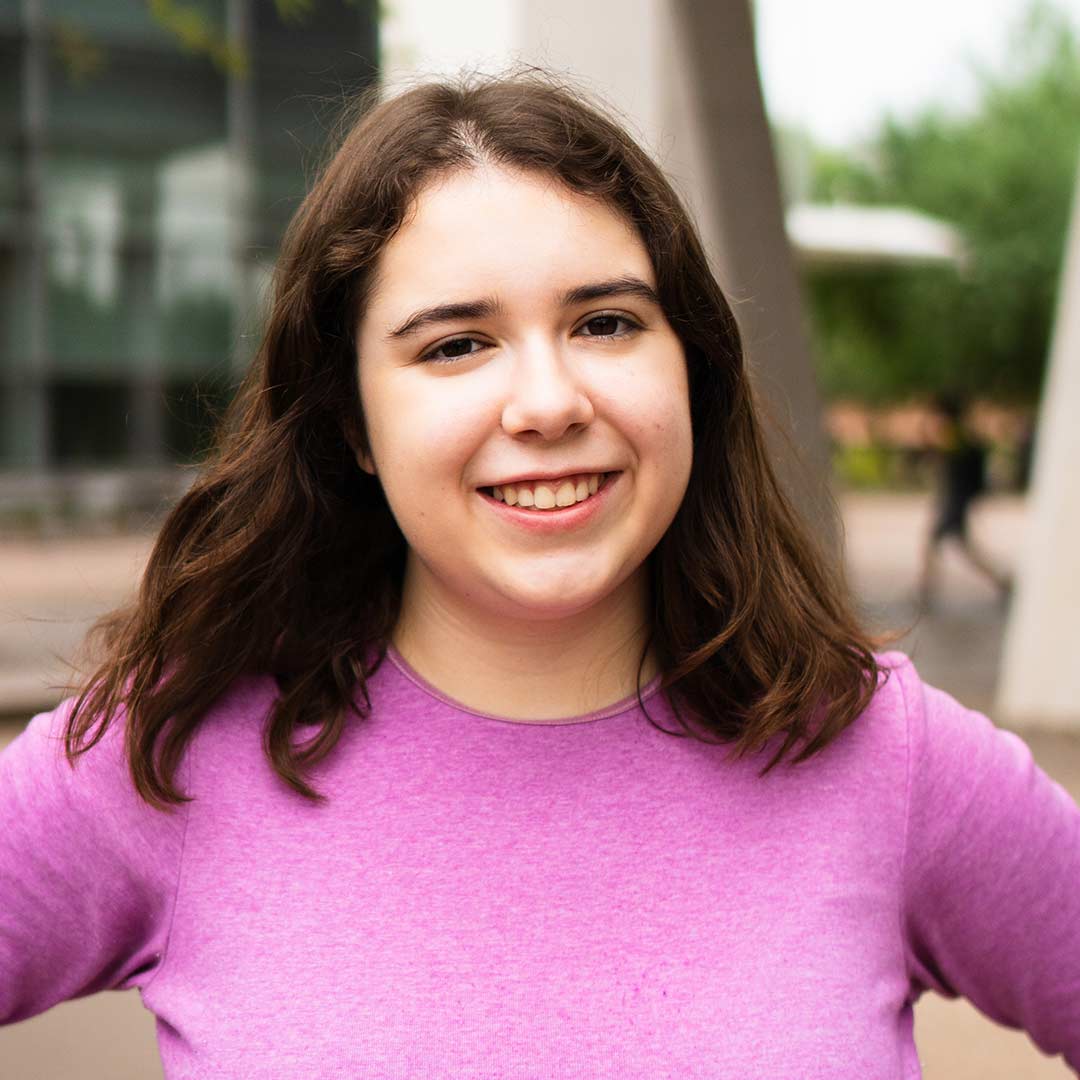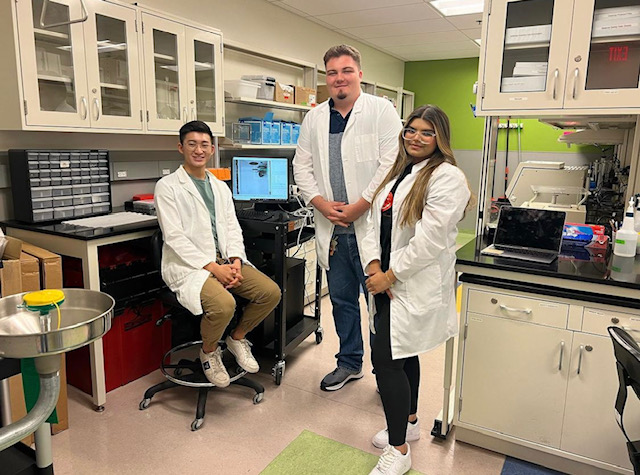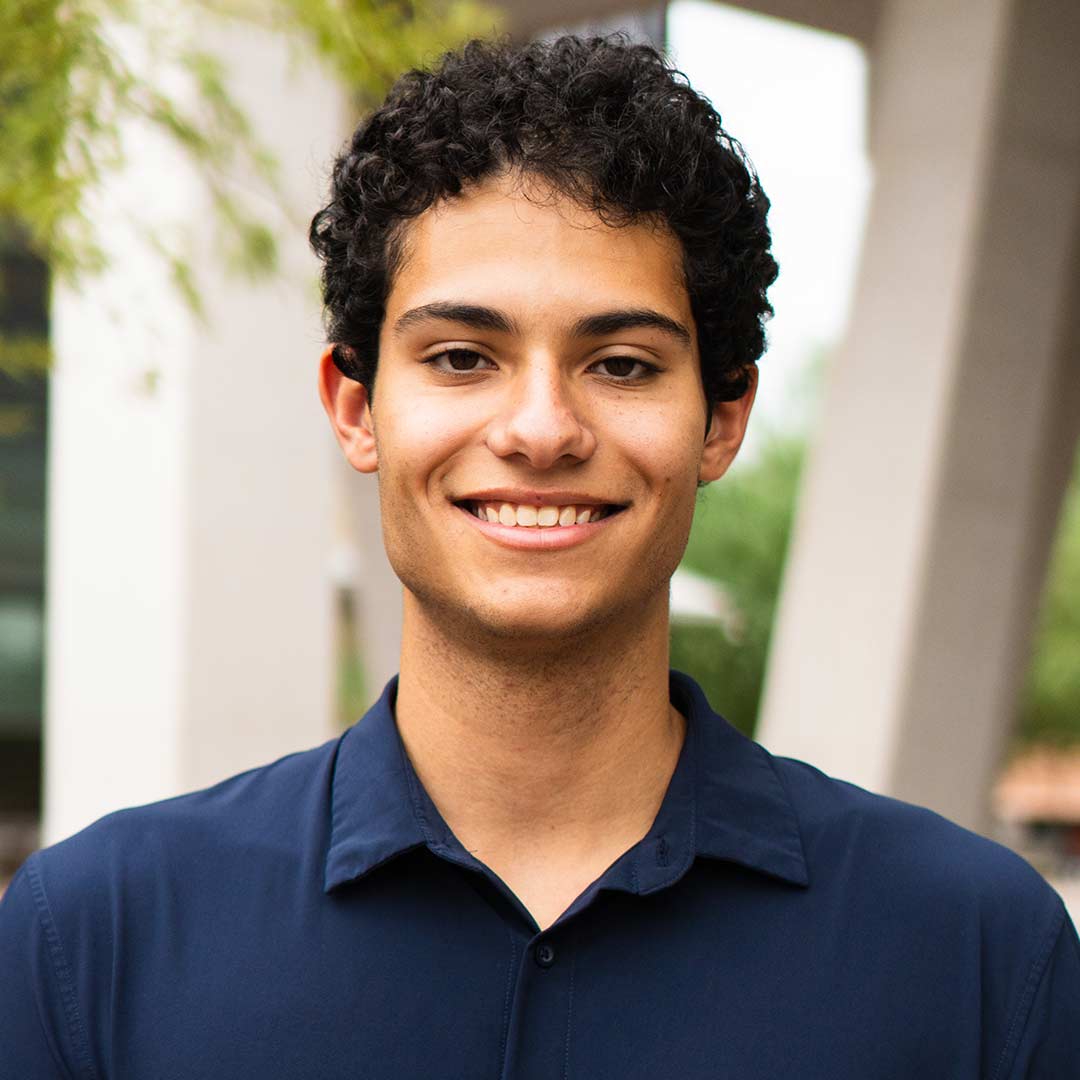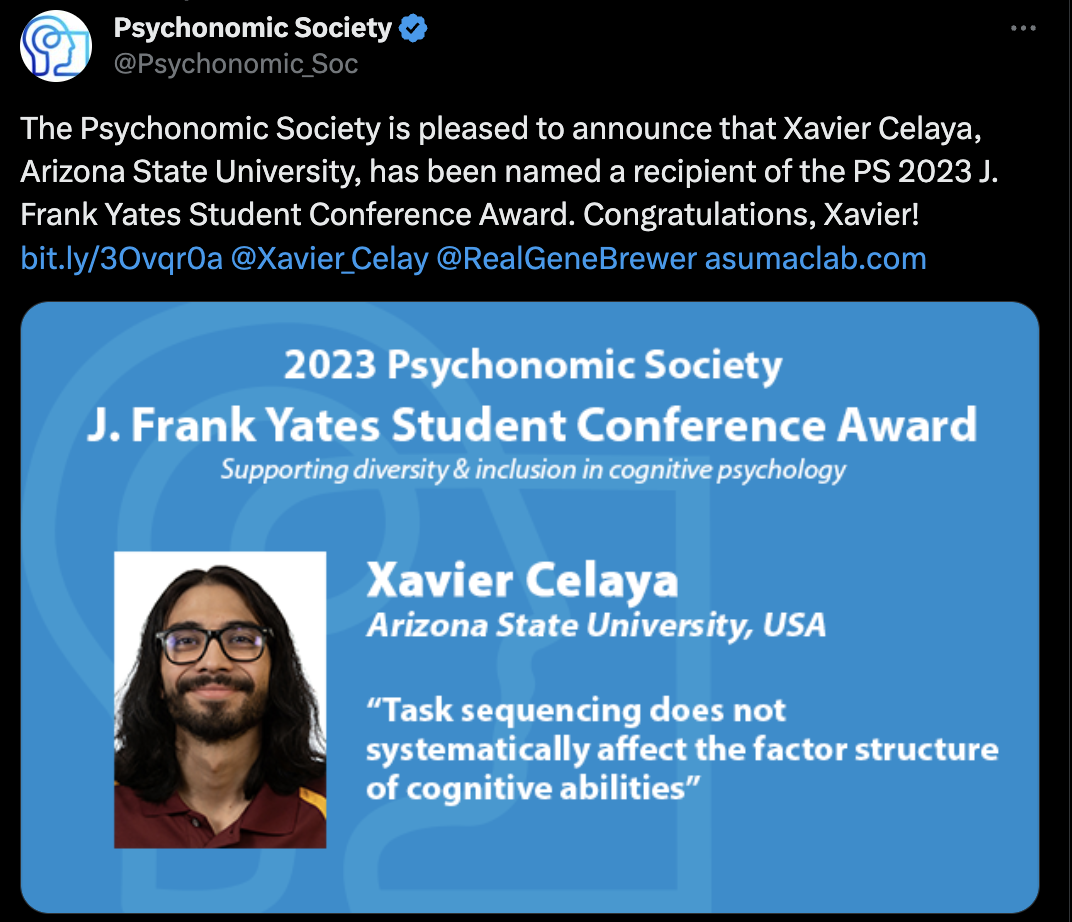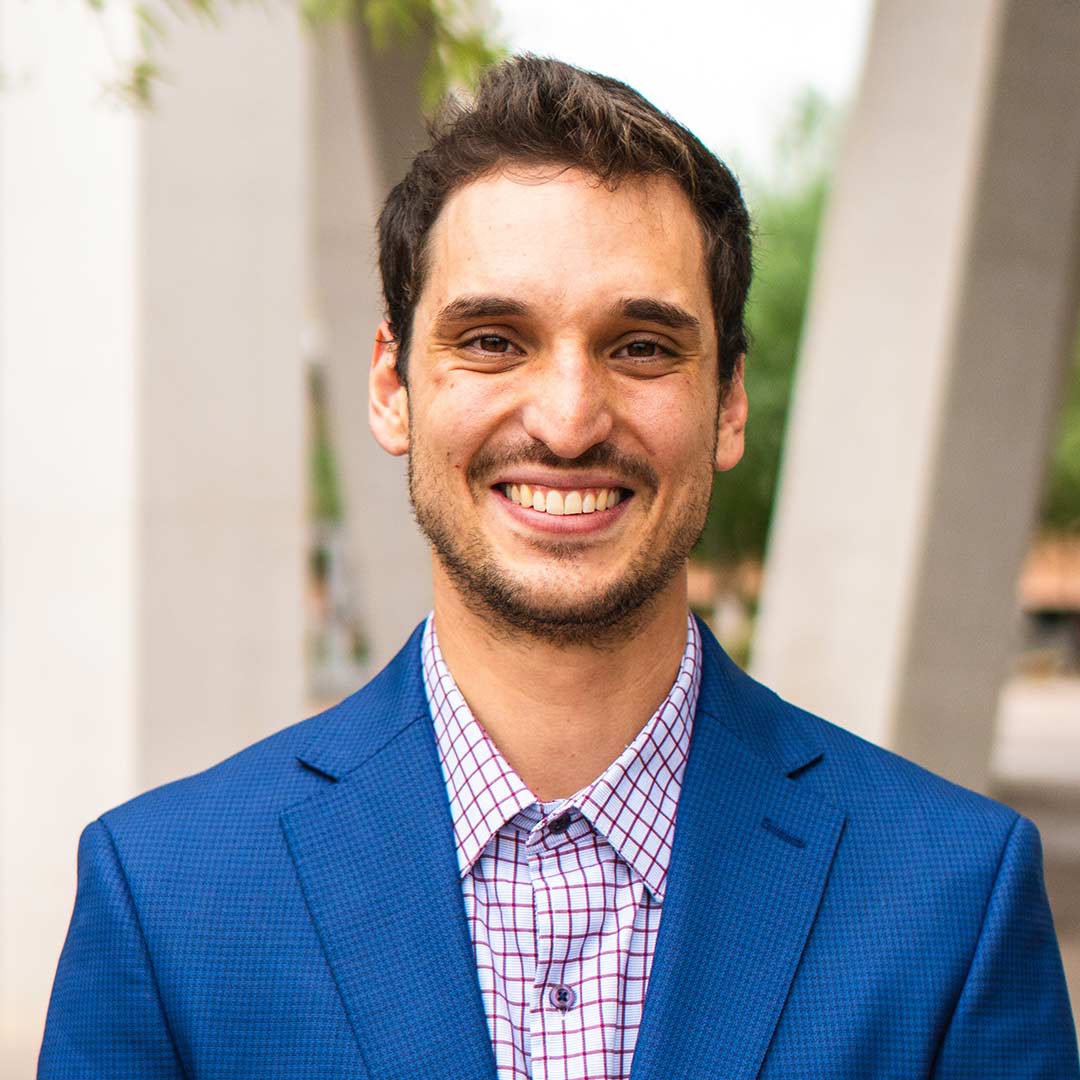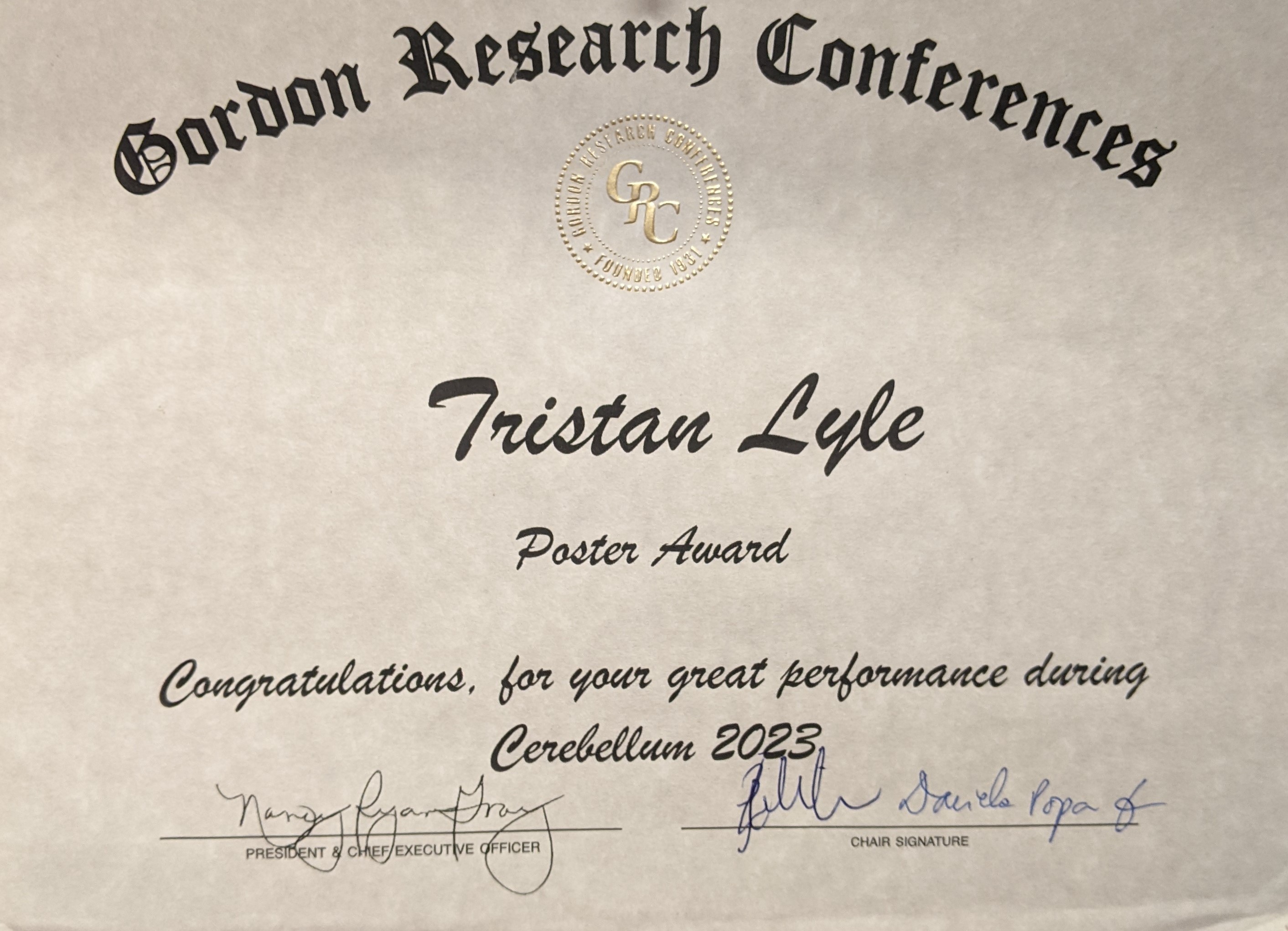Through access to research opportunities, scholarships and mentored, interdisciplinary training, students in Arizona State University's Department of Psychology are pioneering breakthroughs in infant cognition, aging and Alzheimer’s disease, diverse parenting programs and more.
Thanks to the funding and support they are receiving, some students say they can "dedicate more time to (their) passions and research.”
Others say the "limitless" learning opportunities have allowed them to explore and narrow their focus.
And faculty in the department, a unit within The College of Liberal Arts and Sciences, say they are continually impressed with the dedication of the students and that they predict bright futures and impactful careers for them.
Meet some of these learners who are customizing their educational experience and forging paths to success.
Undergraduate students
Mario Alvarez
Mario Alvarez
Alvarez, who is double majoring in psychology and family and human development, was awarded the American Psychological Association's Summer Undergraduate Psychology Experience in Research (SUPER) Fellowship.
As a SUPER Fellow, Alvarez had the unique opportunity to collaborate closely with Assistant Professor Kelsey Lucca in the Emerging Minds Lab. Under Lucca’s mentorship, he gained valuable insight working on the ManyBabies research project.
Research findings from Mario Alvarez and others in the Emerging Minds Lab will provide critical new insights into the foundations of human social cognition. Photo courtesy Emerging Minds Lab
“This project brings researchers together from all around the world to tackle difficult questions about infant cognition and development,” Lucca said.
“Mario was involved in all aspects of the research this summer and juggled many different kinds of tasks. He met with our international collaborators to refine coding protocols, facilitated our weekly lab meetings and brought families with young infants (five to 10 months) into the lab to run the ongoing experiment working to identify how babies form social evaluations and an understanding of right and wrong.”
The SUPER Fellowship program provided a platform for growth and enrichment, with multiple meetings and discussions from guest speakers associated with the American Psychological Association (APA).
Alvarez reflects on his experience, saying, “The speakers showed me the many different trajectories that psychology can take you (on), and hearing the career and life path that the APA staff took only made my excitement for psychology grow even bigger.
“I chose to study psychology because the learning opportunities are limitless in this field, and as someone who is interested in many different aspects of psychology, I’ve been able to explore them all at ASU."
Bella Andrade
Bella Andrade
Andrade, completing dual degrees in psychology and family and human development with a certificate in disability studies, earned top honors for her research at the Arizona Psychological Association. Her work aimed to summarize the evidence of parenting prevention programs in the United States available in a language other than English.
Andrade, the first undergraduate research assistant in Assistant Professor Joanna Kim’s Engaging Families Lab at ASU, discovered a significant gap in support for non-English-speaking parents.
Undergraduate student Bella Andrade won first place for her poster on linguistically diverse parents. Photo courtesy Bella Andrade
Her award-winning poster distilled the results of a systematic review, revealing that out of the hundreds of parenting prevention programs available in the United States, only 27 catered to non-English speakers.
“The main goal of this project was to get a sense of how effective non-English parenting prevention programs are, so we needed to narrow our search to studies that had a comparison group. Going in, we suspected that there wouldn’t be very many studies, but the actual number is humbling. Bella’s poster is proof that we need more funding and policies that support programs for our non-English-speaking families,” Kim said.
Andrade’s dedication to addressing the underrepresentation of diverse groups in psychology research stems from her personal experiences. As someone with a physical disability, she recognizes the need to ensure the field encompasses the entire spectrum of the human experience.
"Unfortunately, psychology research doesn't always focus on minority and diverse groups. I'm physically disabled and I'm rolling into a realm where there is barely any disability represented in the field. It's really important for those people to be heard because they're also part of the human experience. How can we study humans and the brain and behaviors if we are not looking at the whole, diverse picture?" Andrade said.
Megan Nelson
Megan Nelson
Nelson is double-majoring in psychology and biological sciences with a concentration in neurobiology physiology and behavior, as well as pursuing a minor in mathematics and a certificate in computational life sciences. She was honored with a 2023–24 Psychology Scholar Award from the Department of Psychology.
Since starting in fall 2020, she’s actively participated in the psychology community. Initially serving as an undergraduate research assistant, her involvement grew as she engaged in research labs like Assistant Professor Jessica Verpeut’s SOCIAL Neurobiology Lab and President's Professor Heather Bimonte-Nelson’s Behavioral Neuroscience of Memory and Aging Lab. Nelson also serves as the current president for Psi Chi at ASU, where she organizes events and fosters a community of belonging.
"Megan has a scientific heart and intellect. She is naturally curious and inquisitive, intelligent and a very hard worker,” said Bimonte-Nelson, Nelson’s faculty mentor. “Megan’s dedication and work ethic shine in everything she does, and she shows eagerness to deeply learn all aspects of science, from theory to experimental design to hands-on skill sets, all while balancing her schoolwork, other leadership activities, including being president of Psi Chi, and running research in Dr. Jessica Verpeut’s lab. Time and again, Megan is consistently prepared, engaged and attentive with a positive attitude, demonstrating her interest and intellectual curiosity in science. Her future is bright, we support her all the way and I can not wait to see what she does next!"
Nelson advocates for combining experiential learning opportunities, like research lab participation, with club involvement and says it is a great way to network with her peers.
“I joined Psi Chi because I was looking for a club where I could not only meet other students who were interested in psychology and neuroscience, but also where I could share my passion for these subjects with the ASU community,” Nelson said. “I love how personable and friendly the students and professors are! Even though psychology is a popular major at ASU, I can always recognize a familiar face when walking through the department building.”
Vincent Truong
Vincent Truong
Truong, pursuing dual degrees in psychology and biochemistry with a minor in disability studies, is set to make a notable appearance at the upcoming Society for Neuroscience conference in Washington, D.C. He’ll be presenting as both the first and second author on two separate posters.
Truong’s journey to the conference is backed by the Faculty for Undergraduate Neuroscience committee, which awarded him a travel grant recognizing his significant contributions. He also secured a Travel and Professional Development Grant from ASU’s Undergraduate Student Government.
As the first author, Truong will showcase research from a collaboration between Verpeut’s SOCIAL Neurobiology Lab and Bimonte-Nelson’s Behavioral Neuroscience of Memory and Aging Lab. With support from the Arizona Alzheimer’s Consortium, their work focuses on assessing learning ability and cognitive flexibility to unveil early sex differences in aging and Alzheimer’s disease. Truong emphasized the need to address the gender gap in Alzheimer’s research, given the minimal focus on females in current studies.
“We are doing a huge health disservice to half of the population. Resolving this disparity in neuroscience involves careful behavioral research paired with biological data, which I will present at the conference,” Truong said.
On his second author poster, Truong collaborated with the lab of Ulises Ricoy at the University of Arizona on an outreach initiative to create accessible materials for teaching young scientists about neuroscience research and machine learning, ultimately promoting inclusivity in the field.
“Vincent is extremely motivated and is dedicated to understanding the molecular mechanisms behind health-related diseases. Since joining my lab as a freshman, his positive energy and tenacity for learning has driven our research in new directions. For his honor’s thesis, he will explore aging in autism spectrum disorder preclinical models and is working on his first manuscript for publication,” Verpeut said.
Truong chose ASU’s Department of Psychology due to its robust outreach programs and support for the community. He was also impressed with the career support resources and avenues available to advance one’s interests. He encourages fellow undergraduates to pursue their genuine passions, stressing that passion is the driving force behind effort, persistence and work ethic.
“Putting (in) the effort to reflect and build on your interests will make it much easier to draft applications for opportunities and grants to attend conferences. Your personality, dedication and excitement for your specific passion will inevitably shine through,” Truong said.
As part of his collaboration with the lab of Ulises Ricoy at the University of Arizona, Vincent Truong helped create accessible materials to teach young scientists about conducting neuroscience research. Photo courtesy Vincent Truong
Henrique Vieira
Henrique Vieira
Hailing from Belo Horizonte, Brazil, Vieira is double-majoring in neuroscience and psychology. He’s the recipient of the 2023–24 Jenessa Shapiro Undergraduate Research Scholarship, a $5,000 award from the ENERGIZE Psychology Research Initiative aimed at supporting students from underrepresented backgrounds with potential in psychology research.
“The Jenessa Shapiro Scholarship is facilitating my long-term goal to get a PhD in neuroscience by enabling me to dedicate more time to my passions and research,” Vieira said.
This support is crucial for his work with the SOCIAL Neurobiology Lab, where they explore the role of the cerebellum in social behavior. With his graduate mentor, Tristan Lyle, Vieira is quantifying neural activation using the immediate early-gene, c-Fos, resulting from a cerebellar perturbation during adolescent life in preclinical models.
Verpeut, his supervisor and mentor, acknowledges Vieira’s significant impact on the lab, noting his unique perspectives as a Jesnessa Shapiro Scholarship recipient.
“Henrique has incredible determination, despite facing unique hardships as an underrepresented student. Thanks to the support of the Department of Psychology and the Jenessa Shapiro Scholarship, Henrique can complete his educational and research pursuits in neuroscience at ASU. He plans to apply to a neuroscience PhD program next fall and will be attending the Society for Neuroscience conference in November to expand his knowledge in neuroscience and research graduate programs. It is the best part of my job to mentor students like Henrique and help them reach their goals,” Verpeut said.
Vieira aspires to continue to serve as a role model within the ASU psychology community, promoting values of strength, resilience and determination — characteristics shared by both the Jenessa Shapiro Scholarship recipients and the department.
Vieira emphasized the importance of hard work and determination in achieving one's goals, stating, “You have to work hard toward every single goal. Despite the difficulties life throws at me, I’ll never give up.”
Graduate students
Xavier Celaya
Xavier Celaya
Celaya, a doctoral psychology student specializing in cognitive science, was honored with the prestigious J. Frank Yates Student Conference Award from the Psychonomic Society, an annual recognition for exceptional graduate students from underrepresented populations in psychology. This accolade comes with a $1,000 stipend to support his participation in the society’s annual meeting in November.
In collaboration with Professor Gene Brewer’s Memory and Attention Control Laboratory, Celaya’s work is supported by an ASU Foundation grant from Steve Neumann to study trauma and mentalizing. His research focused on the impact of task sequencing in latent variable modeling, a key method in psychological research. Findings revealed that task sequencing does not significantly impact the recovery of estimates of latent cognitive abilities.
Brewer, Celaya’s faculty mentor, explained, “Xavier's research in this area is methodologically rigorous and an important advancement for researchers and applied scientists who aim to quantify individual differences in human mental ability. His research has implications for assessing cognition that has tremendous value in many domains, including personnel selection, team building and professional development. Xavier's excellent program of research and incredible work ethic make him deserving of this award and I am personally thrilled to see him receive it.”
As he prepares to accept this award and present his research, Celaya sees this milestone shaping his future career by reinforcing his commitment to diversity and inclusion in psychological research. He credits ASU’s Department of Psychology for its robust support throughout his academic journey, fostering growth, innovation and inclusivity.
Celaya’s advice to aspiring psychology scholars? “Seek to cultivate a supportive and diverse learning environment that enriches both your field and your own individual learning experience.”
Xavier Celaya’s research on the impact of task sequencing in latent variable modeling helped earn him the J. Frank Yates Student Conference Award from the Psychonomic Society. Photo courtesy Xavier Celaya
Matthew Langley
Matthew Langley
Specializing in the cognitive science area of psychology, doctoral student Langley won editor’s choice for best article in the American Psychological Association’s Journal of Experimental Psychology.
Collaborating with Professor Michael McBeath in the PEARL: Perception, Ecological Action, Robotics and Learning Lab, his research revealed how people view the world around them — a phenomenon known as vertical attention bias (VAB) — where people have a tendency to place our attention on elements in the top portions of objects while we place our attention on elements in the bottom portions of scenes.
“I am elated to have this work selected for the APA Editor's Choice Award. My advisor, Dr. Mike McBeath, and I had a ton of fun working on this project together. We put in a lot of effort and it's exciting that there is an opportunity to have our project read by a wider audience,” Langley said.
Taking his research to the next level, Langley joined forces with undergraduate researcher Kaitlin Van Houghton in Lucca’s Emerging Minds Lab. The team researched VAB in children between 4 and 7 years old, testing their perception of the world compared to adults. This cross-area collaboration is a hallmark of ASU’s Department of Psychology.
“Understanding attentional biases helps people to better plan and design environments,” McBeath said. “It has been especially rewarding that Matt has been able to extend his initial VAB findings to the Emerging Minds Lab, which resulted in the replication of VAB with children, and is next being tested in infants.”
Olivia Law
Olivia Law
Law received the 2023–24 Graduate College University Grant (GCUC) to support her research on her path to a PhD. She’s also the recipient of the ASU Graduate College Travel Award, which she’ll use to attend the Society for Neuroscience conference this November.
Originally from Pocatello, Idaho, she earned a bachelor's degree in psychology from Idaho State University, where her passion for research ignited.
“I was in two different research labs during my undergraduate career, and my experience in these labs helped me realize I wanted to continue my education as a graduate researcher,” Law said.
In 2022, Law enrolled in ASU’s doctoral psychology program, specializing in behavioral neuroscience and comparative psychology. Under the mentorship of Verpeut in the SOCIAL Neurobiology Lab, she studies the impact of opioid withdrawal on behavior, neuroplasticity and gene expression.
Verpeut praised Law’s academic excellence, affirming her deservingness of the GCUC award.
“Olivia has maintained academic excellence at ASU, as well as in her research pursuits studying the implications of drug addiction and withdrawal in preclinical models. This November, she will be presenting the first results of her project at the Society for Neuroscience conference. Her motivation and interest in addiction research will lead to a broader understanding of genes, neural circuits and behavior.”
Looking ahead, Law remains committed to understanding the effects of drug misuse on behavior and cellular levels. Her goal is to contribute to the knowledge base that may inform future treatment targets.
“While I’m uncertain where my graduate research will lead, I'm eager to continue learning and contribute to the evolving field of psychology,” Law said.
Tristan Lyle
Tristan Lyle
Lyle, who received the best poster award at the Cerebellum Gordon Research Conference, is a promising figure in behavioral neuroscience and comparative psychology. Under the mentorship of Verpeut in the SOCIAL Neurobiology Lab, his research centers on the cerebellum — a brain region traditionally associated with motor functions but now recognized for its role in non-motor aspects, such as cognition.
In his preclinical studies, Lyle employs chemogenetics — tools that alter the signaling properties of neurons — to investigate the development of juvenile cerebellar nuclei in shaping cognitive and social behavior later in life.
“The cerebellum is very important in early-life development, and damage to this brain region is known to impact cognitive, social, motor and various complex behaviors,” Verpeut said. “Despite these findings, the cerebellum is an understudied brain structure with even less known about the cerebellar nuclei. Tristan’s research is critical to the autism field in order to discover new pathways and possible therapeutic targets.”
Lyle’s passion for studying neuroscience methodologies and the cerebellum’s role in cognition grew from his pursuit of a master’s degree in applied behavior analysis at ASU. The program led him to inquire about the relationship between behavior and the brain in clinical populations. His current PhD program provides a fresh perspective on this relationship.
Regarding ASU’s research environment, Lyle says it is highly collaborative and interdisciplinary in nature, and students often find themselves drawn to new areas of interest. He encourages fellow students to not hesitate in reaching out to faculty members, sharing that “they love teaching students and taking on mentees to join their lab and research.”
Tristan Lyle won best poster award at the Cerebellum Gordon Research Conference. Photo courtesy Tristan Lyle
More Science and technology

Hack like you 'meme' it
What do pepperoni pizza, cat memes and an online dojo have in common?It turns out, these are all essential elements of a great…

ASU professor breeds new tomato variety, the 'Desert Dew'
In an era defined by climate volatility and resource scarcity, researchers are developing crops that can survive — and thrive —…

Science meets play: ASU researcher makes developmental science hands-on for families
On a Friday morning at the Edna Vihel Arts Center in Tempe, toddlers dip paint brushes into bright colors, decorating paper…


